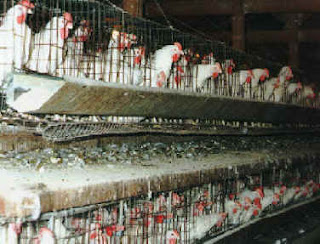
EU confirms 2012 ban on battery cages
First, on 8th January 2008 the European Commission has upheld the decision made in 1999 by the European Union when it passed the Laying Hens Directive (1999/74/EC) to ban battery cages for hens by 2012 in all its member states. There will be no postponement, the Commission said in a published report.
There had been fears that the date of 2012 could be delayed, due to pressures from egg industry lobbies in many EU countries that continued for many years. The International Egg Commission had previously issued statements saying that the EU Laying Hens Directive sent a ripple around the world, with the global battery cage industry fearing a domino effect in other countries like the USA, Canada and Australia.
18 million is the number of hens still kept in battery cages a year in the UK, and over 200 million each year in the EU.
The European Commission’s report in January concluded that the cost of switching to cage-free eggs could be less than one cent of a euro per egg, but the higher welfare standards could give EU producers a commercial advantage over non-EU competitors.
“There is clearly a growing market for animal welfare friendly products,” states the report. “Recent Eurobarometer surveys on consumer attitudes to animal welfare revealed that the majority of respondents would be willing to pay more for eggs sourced through animal welfare friendly production systems.”
Explaining the reasons for the decision to uphold the ban, EU Commissioner for Health Mr Markos Kyprianou said: “The commission listened to the demands of EU consumers and has taken concrete action to improve the welfare of laying hens”.
And this brings us to the second good news item which highlights the power of the media when they get involved in animal issues.

UK consumers switch to free-range due to media coverage of factory farms cruelty
In the UK there has been a massive change in consumers habits following TV programs and newspaper coverage of poultry factory farming.
In January 2008 Channel 4, a major British TV network, broadcast a series of food programmes with celebrity chefs Hugh Fearnley-Whittingstall and Jamie Oliver launching a high-profile campaign to show the general public what battery cages and broiler sheds mean for the animals. At the same time the RSPCA (Royal Society for the Prevention of Cruelty to Animals) placed advertisements in national newspapers to create what appeared a coordinated campaign. The Independent, a major UK national newspaper, published secret footage from an intensive farm exposing the cruelty inflicted on broiler chickens.
The effects of this have been huge, and perhaps unpredicted.
Sales of free-range poultry shot up by 35 per cent in January 2008 compared with January 2007, while sales of factory-farmed chickens slumped by 7 per cent, according to a survey by the market research company TNS. The trend has continued throughout February as well.
Supermarkets shelves have been emptied of free-range birds, causing complaints from frustrated shoppers eager to embrace the movement away from factory farming.
The increase in free-range chickens sales would have been even higher if producers had been able to keep up with the demand.
“But the new national sales data suggests that shoppers' priorities have shifted dramatically. If the TNS data was extrapolated to the rest of the UK, it suggests sales of factory-farmed chickens dipped by 10 million, while shoppers bought 4.4 million more free-range chickens. Overall, chicken sales were down by 4.8 per cent, perhaps because many people, when faced with an absence of free-range chicken, simply bought no chicken” writes The Independent.
Sainsbury's supermarket poultry department agreed with the picture of roaring free-range sales: "Sales are up 50 per cent year on year so it means we are selling more free-range than we have ever sold. It's also fair to say sales would have been much greater if we had stock to meet demand."
At the same time, several major British supermarket chains, Sainsbury's, Morrison, Co-op, Marks & Spencer and Waitrose, will stop selling battery eggs or have already done so. Something similar is happening with the sale of intensively-reared broiler chickens. Within just two years, UK supermarkets could be selling only eggs laid by barn, free-range and organic free-range hens. The Co-op has also set a target of 2010 for being cage-free on all egg ingredients of all its own label products.
Hellmann's UK has made a groundbreaking decision to become free-range on all its mayonnaise by June 2008. A company representative had been questioned on its use of battery eggs during one of the Channel 4 programs on factory farming.
The tidal change in consumers demand has made front page news.
Chef Hugh Fearnley-Whittingstall, who hosted some of the anti-factory-farming shows, intends to make a new television programme on chickens later this year. He said: "I am delighted we have helped create this change and I am delighted that, two months after the show, there appears to be no letting up.”
1 comment:
Hi greaat reading your blog
Post a Comment